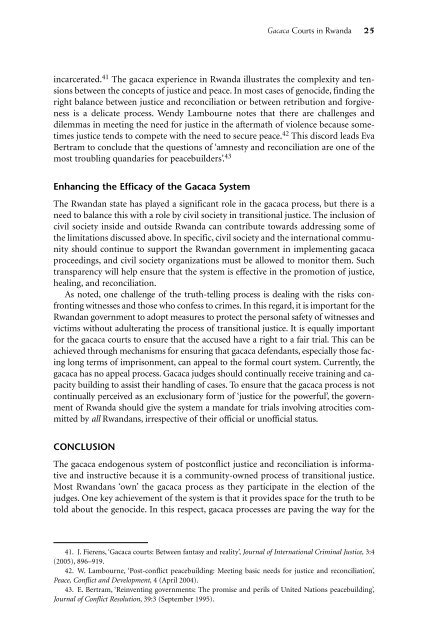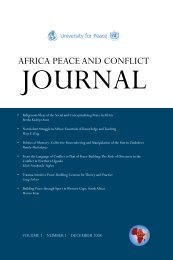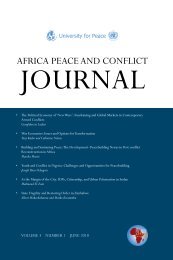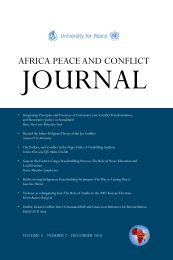Download - Africa Peace and Conflict Journal - The University for ...
Download - Africa Peace and Conflict Journal - The University for ...
Download - Africa Peace and Conflict Journal - The University for ...
You also want an ePaper? Increase the reach of your titles
YUMPU automatically turns print PDFs into web optimized ePapers that Google loves.
Gacaca Courts in Rw<strong>and</strong>a 25incarcerated. 41 <strong>The</strong> gacaca experience in Rw<strong>and</strong>a illustrates the complexity <strong>and</strong> tensionsbetween the concepts of justice <strong>and</strong> peace. In most cases of genocide, finding theright balance between justice <strong>and</strong> reconciliation or between retribution <strong>and</strong> <strong>for</strong>givenessis a delicate process. Wendy Lambourne notes that there are challenges <strong>and</strong>dilemmas in meeting the need <strong>for</strong> justice in the aftermath of violence because sometimesjustice tends to compete with the need to secure peace. 42 This discord leads EvaBertram to conclude that the questions of ‘amnesty <strong>and</strong> reconciliation are one of themost troubling qu<strong>and</strong>aries <strong>for</strong> peacebuilders’. 43Enhancing the Efficacy of the Gacaca System<strong>The</strong> Rw<strong>and</strong>an state has played a significant role in the gacaca process, but there is aneed to balance this with a role by civil society in transitional justice. <strong>The</strong> inclusion ofcivil society inside <strong>and</strong> outside Rw<strong>and</strong>a can contribute towards addressing some ofthe limitations discussed above. In specific, civil society <strong>and</strong> the international communityshould continue to support the Rw<strong>and</strong>an government in implementing gacacaproceedings, <strong>and</strong> civil society organizations must be allowed to monitor them. Suchtransparency will help ensure that the system is effective in the promotion of justice,healing, <strong>and</strong> reconciliation.As noted, one challenge of the truth-telling process is dealing with the risks confrontingwitnesses <strong>and</strong> those who confess to crimes. In this regard, it is important <strong>for</strong> theRw<strong>and</strong>an government to adopt measures to protect the personal safety of witnesses <strong>and</strong>victims without adulterating the process of transitional justice. It is equally important<strong>for</strong> the gacaca courts to ensure that the accused have a right to a fair trial. This can beachieved through mechanisms <strong>for</strong> ensuring that gacaca defendants, especially those facinglong terms of imprisonment, can appeal to the <strong>for</strong>mal court system. Currently, thegacaca has no appeal process. Gacaca judges should continually receive training <strong>and</strong> capacitybuilding to assist their h<strong>and</strong>ling of cases. To ensure that the gacaca process is notcontinually perceived as an exclusionary <strong>for</strong>m of ‘justice <strong>for</strong> the powerful’, the governmentof Rw<strong>and</strong>a should give the system a m<strong>and</strong>ate <strong>for</strong> trials involving atrocities committedby all Rw<strong>and</strong>ans, irrespective of their official or unofficial status.CONCLUSION<strong>The</strong> gacaca endogenous system of postconflict justice <strong>and</strong> reconciliation is in<strong>for</strong>mative<strong>and</strong> instructive because it is a community-owned process of transitional justice.Most Rw<strong>and</strong>ans ‘own’ the gacaca process as they participate in the election of thejudges. One key achievement of the system is that it provides space <strong>for</strong> the truth to betold about the genocide. In this respect, gacaca processes are paving the way <strong>for</strong> the41. J. Fierens, ‘Gacaca courts: Between fantasy <strong>and</strong> reality’, <strong>Journal</strong> of International Criminal Justice, 3:4(2005), 896–919.42. W. Lambourne, ‘Post-conflict peacebuilding: Meeting basic needs <strong>for</strong> justice <strong>and</strong> reconciliation’,<strong>Peace</strong>, <strong>Conflict</strong> <strong>and</strong> Development, 4 (April 2004).43. E. Bertram, ‘Reinventing governments: <strong>The</strong> promise <strong>and</strong> perils of United Nations peacebuilding’,<strong>Journal</strong> of <strong>Conflict</strong> Resolution, 39:3 (September 1995).






